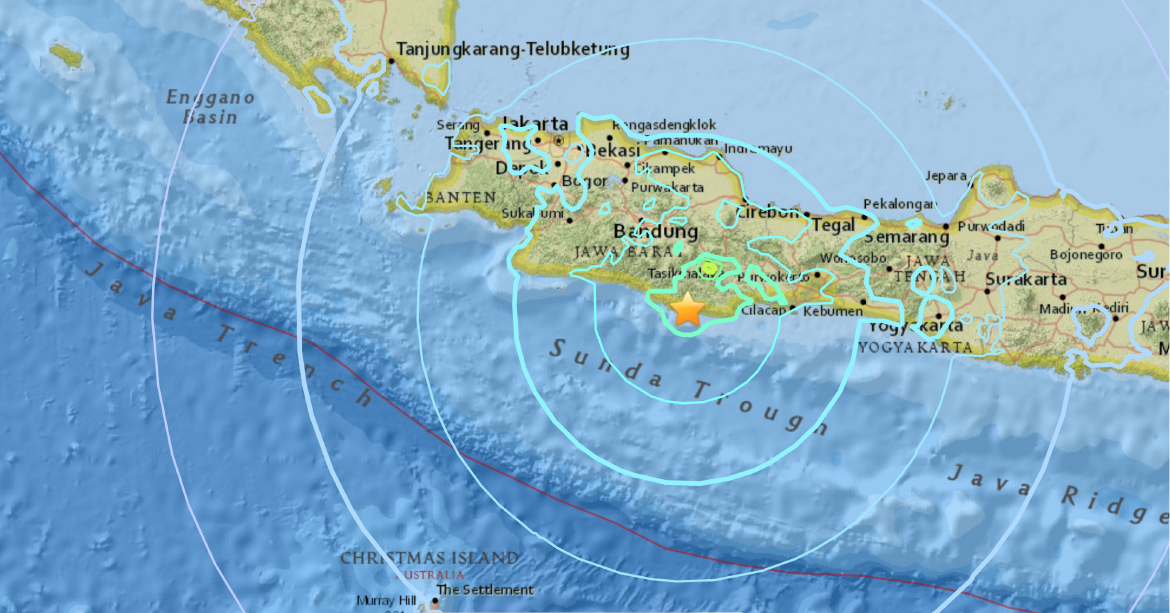


An earthquake with a magnitude of 6.5 struck Indonesia's West Java province, with its epicentre located southwest of Garut regency. The tremors were felt in nearby Jakarta, Banten, Central Java, Yogyakarta, and East Java. Although the tremors reached a strong intensity in some areas, there was no potential for triggering giant waves, according to the country's meteorology, climatology and geophysics agency. Indonesia, which is situated on the "Pacific Ring of Fire," is no stranger to earthquakes and other natural disasters.
Indonesia's 6.5 Earthquake: Understanding the Ring of Fire and Tsunami Risks
Background:
Indonesia, located on the infamous "Pacific Ring of Fire," is prone to frequent seismic activity due to its proximity to multiple tectonic plate boundaries. This horseshoe-shaped zone around the Pacific Ocean is characterized by high volcanic and earthquake occurrence, with Indonesia being one of the most vulnerable countries.
Indonesia's complex geology involves the subduction of the Indian Ocean plate beneath the Sunda plate, resulting in frequent earthquakes and volcanic eruptions along the Java Trench. The country has experienced numerous devastating earthquakes in the past, including the 2004 Indian Ocean earthquake and tsunami, which claimed over 230,000 lives across multiple countries.
Recent Earthquake:
On December 18, 2022, an earthquake with a magnitude of 6.5 struck Indonesia's West Java province. The epicenter was located southwest of Garut regency, and tremors were felt as far as Jakarta, Banten, Central Java, Yogyakarta, and East Java.
The quake reached a maximum intensity of VI on the Modified Mercalli Intensity scale in some areas, causing panic and damage to buildings. However, there were no immediate reports of major casualties or significant structural damage.
Tsunami Risk:
While earthquakes in Indonesia carry the potential for triggering tsunamis, the meteorology, climatology and geophysics agency of Indonesia (BMKG) has ruled out the possibility of a tsunami in this case. The earthquake's epicenter was located inland, and the magnitude was not significant enough to generate a tsunami.
Top 5 FAQs:
1. Why does Indonesia experience frequent earthquakes? Indonesia is located on the Pacific Ring of Fire, where multiple tectonic plates collide, causing subduction zones and increased seismic activity.
2. Are all earthquakes in Indonesia strong enough to cause a tsunami? No. Only earthquakes with epicenters near or beneath the ocean floor and a significant magnitude have the potential to generate tsunamis.
3. What should I do if I feel an earthquake? During an earthquake, it is important to stay calm and follow these steps:
4. What is a tsunami warning and what should I do when I hear one? A tsunami warning indicates that a tsunami may be imminent or has already occurred. When you hear a warning, evacuate to higher ground immediately and stay away from the coast.
5. How can I prepare for earthquakes and tsunamis? Prepare an emergency kit with essential supplies, such as water, food, flashlight, first-aid kit, and important documents. Secure your home by anchoring heavy objects and securing loose items. Familiarize yourself with evacuation routes and designate meeting points for your family. Participate in emergency preparedness drills and stay informed about earthquake and tsunami risks in your area.

During the Emerging Science Technology and Innovation Conclave, PM Modi announced the launch of the Rs 1 lakh crore Research, Development and Innovation Fund. This fund, under the Department of Science and Technology, aims to encourage private sector investments in R&D to drive India's vision of becoming an innovation-driven nation. With this fund, India's R&D expenditure has doubled in the last decade and the country now has the world's third-largest startup ecosystem. PM Modi also highlighted how India's domestic capability has accelerated during the COVID-19 pandemic due to its successful digital public infrastructure.

A stampede at the Kasibugga Venkateswara Swamy Temple in Andhra Pradesh has left 10 dead and two injured. The temple had recently reopened and was experiencing high footfall due to a festival. Home Minister Vangalapudi Anitha has ordered a thorough investigation into the causes of the tragedy and has promised strict measures to prevent similar incidents in the future.

India and the United States have strengthened their already strong ties by signing a 10-year framework for their major defense partnership. The agreement, signed during a bilateral meeting between the two countries' defense ministers, emphasizes the importance of this partnership in maintaining a free and open Indo-Pacific region. This marks a significant step in solidifying the bond between India and the US in the defense sector.

In preparation for a major tri-service military drill, India has issued Notices to Airmen (NOTAM) for the entire northeastern region that borders China, Bhutan, Myanmar, and Bangladesh. The first set of exercises will commence in November and continue through January, signaling enhanced operational readiness for the Indian Air Force (IAF). This move is significant as the Northeast remains a sensitive theater, making up the boundary with four countries, including China. The upcoming IAF exercises aim to strengthen India's air dominance, effectively preparing for any potential challenges along the western frontier with Pakistan.

India will conduct a 10-day military exercise in Rajasthan and Gujarat involving the Army, Air Force, and Navy to showcase its operational readiness following Operation Sindoor earlier this year. The exercise, announced through a NOTAM, features advanced military technologies and emphasises the integration of speed, firepower, and precision in desert warfare conditions. It comes amidst heightened tensions with Pakistan and a renewed focus on maintaining military readiness along the border.

Jammu and Kashmir police have filed an FIR against a group of Christian missionaries in Kathua district for allegedly attempting religious conversions through financial incentives. This comes after a video surfaced online showing the missionaries being attacked and their vehicle vandalized by villagers. The incident has sparked outrage and protests from local Hindu groups, demanding action against the accused missionaries. One accused, Ravindra Singh Thela, has been arrested while the main accused, Vivek Soni, is still at large. The police have also suspended eight personnel for failing to stop the attack.

US Vice President JD Vance, who converted to Catholicism in 2019, has revealed that he hopes his Hindu-raised wife, Usha Vance, will eventually embrace Christianity. However, he clarifies that their interfaith marriage is built on mutual respect and understanding, and that Usha has complete freedom of choice in matters of faith. The couple has found a balanced way to manage their interfaith household, with their children attending a Christian school and given the choice to be baptized.

US President Donald Trump has expressed optimism about reaching a trade deal with China "pretty soon" after a meeting with Chinese President Xi Jinping in South Korea. In addition to announcing lower tariffs on Chinese imports, Trump also stated that the issue over US access to rare earths has been resolved. However, there has been no official response from Beijing and the final decision on the sale of Chinese-owned TikTok's US operations is still pending. Analysts see these developments as a breakthrough in the ongoing trade tensions between the two countries. Our correspondents provide insight on the discussions between the two leaders and speculate on why Xi may have felt confident walking into the meeting.

At the Asia-Pacific Economic Cooperation (APEC) Summit in South Korea, Chinese President Xi Jinping and US President Donald Trump met for their first in-person talks in several years. Despite past frictions, Xi called for closer cooperation between the two largest economies in the world, emphasizing the importance of being "partners and friends." Acknowledging Trump's peace efforts in the Middle East, Xi commended his contributions and praised him as a "tough negotiator." Trump also expressed optimism for a productive discussion on trade and global security.

In a historic event, Prime Minister Shri Narendra Modi addressed the Global Maritime Leaders Conclave and chaired the Global Maritime CEO Forum at India Maritime Week 2025 in Mumbai, welcoming participants from over 85 countries. With major shipping giants, startups, policymakers, and innovators in attendance, the summit showcased India's advancements in the maritime sector, such as the replacement of outdated colonial laws with modern ones and the recognition of large ships as infrastructure assets. Amidst global tensions, India stands as a symbol of strategic autonomy and inclusive growth, ready to take on a leading role in the world's rough seas.